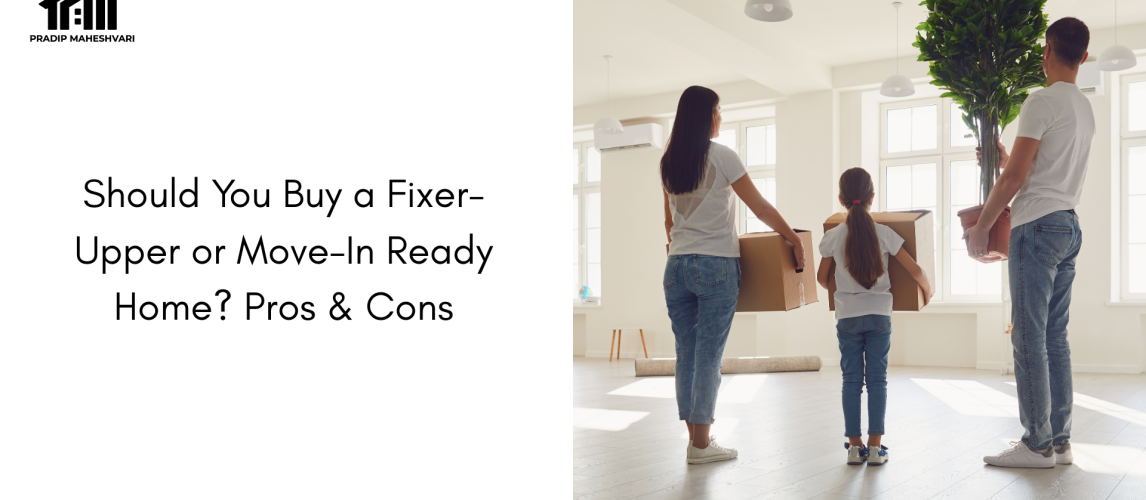Finding the right home is one of the biggest financial decisions you’ll make, but it’s not just about location and price; it’s also about whether you choose a fixer-upper or a move-in ready property. Each option comes with its own benefits, trade-offs, and long-term implications for your mortgage strategy. A fixer-upper offers customization and potential savings, while a move-in ready home delivers convenience, lower upfront stress, and immediate livability.
In Canada’s competitive housing market, this decision matters more than ever. With rising home prices, limited inventory of fully finished properties, and flexible financing options, deciding should you buy a fixer-upper or move-in ready home requires a careful look at your budget, lifestyle, and long-term goals.
Fixer-Upper Homes — Pros and Cons
Let’s start by exploring the potential benefits and challenges of buying a fixer-upper in today’s Canadian housing market.
Pros of Buying a Fixer-Upper
- Lower Purchase Price: Typically more affordable than move-in ready homes.
- Customization Opportunities: Renovate to match your taste and lifestyle.
- Potential Value Appreciation: Strategic upgrades can boost resale value.
- Reduced Competition: Less buyer demand compared to fully finished properties.
Financing Options for Renovations
- CMHC Improvement Program: Covers eligible home upgrades.
- Home Equity Financing: Use existing equity for large-scale renovations.
- Mortgage Bundling: Combine renovation costs into your mortgage.
Cons of Buying a Fixer-Upper
- Higher Renovation Costs: Budget overruns are common.
- Longer Move-In Timelines: Extensive repairs can delay occupancy.
- Unexpected Structural Issues: Hidden problems may increase expenses.
- Financing Challenges: Lenders often require appraisals for renovation loans.
Risk Mitigation Tips
- Get a professional property inspection before buying.
- Secure detailed contractor quotes early.
- Build a 10–15% contingency budget for unexpected costs.
Move-In Ready Homes — Pros and Cons
If you want a hassle-free homebuying experience, a move-in ready property might seem ideal. But let’s look at both sides.
Pros of Buying a Move-In Ready Home
- Immediate Occupancy: Ideal for families needing a quick transition.
- Predictable Costs: Fewer surprise repairs and renovation expenses.
- Modern Finishes & Upgrades: Energy-efficient systems and appliances often included.
- Easier Mortgage Approvals: Preferred by lenders for quick funding.
Advantages for First-Time Homebuyers
- Lower stress with fewer upfront decisions.
- Easier CMHC mortgage qualification.
- Reduced long-term maintenance concerns.
Cons of Buying a Move-In Ready Home
- Higher Purchase Price: Convenience comes at a premium.
- Limited Customization: Less flexibility in layouts and finishes.
- More Buyer Competition: Increased demand can drive up prices.
- Hidden Costs: HOA fees, landscaping, and staging costs may apply.
Key Factors to Consider Before Deciding
Choosing between a fixer-upper and a move-in ready home depends on several personal and financial factors.
1. Budget and Mortgage Options
Understanding your financial situation is the first step toward making the right decision. Compare how much you can afford upfront and how your mortgage approval might differ based on the type of home.
- Compare down payment requirements and mortgage pre-approval amounts.
- Evaluate renovation financing options against conventional home loans.
- Factor in potential renovation costs if considering a fixer-upper.
2. Lifestyle and Timeline
Your lifestyle and move-in timeline should heavily influence your choice. If you need a home quickly, a move-in ready property may be more practical. However, if you have time and flexibility, a fixer-upper could be a rewarding project.
- Assess how soon you need to occupy the home.
- Determine whether you have the bandwidth to manage renovations.
- Consider work, family, and location factors impacting your timeline.
3. Long-Term Investment Goals
Think about how this purchase fits into your future plans. Some buyers prioritize short-term affordability, while others focus on maximizing future value.
- Plan for resale potential and possible equity gains.
- Study property appreciation trends in your preferred neighborhood.
- Decide if you want a long-term investment or a short-term living solution.
Conclusion
Deciding should you buy a fixer-upper or move-in ready home comes down to your budget, lifestyle, and long-term goals. A fixer-upper offers flexibility and the potential for equity growth, while a move-in ready property provides convenience and predictable costs.
Still unsure which is right for you? Pradip Maheshvari, an experienced Canadian mortgage broker, can guide you through tailored financing solutions to secure the best deal for your next property.


No comment yet, add your voice below!